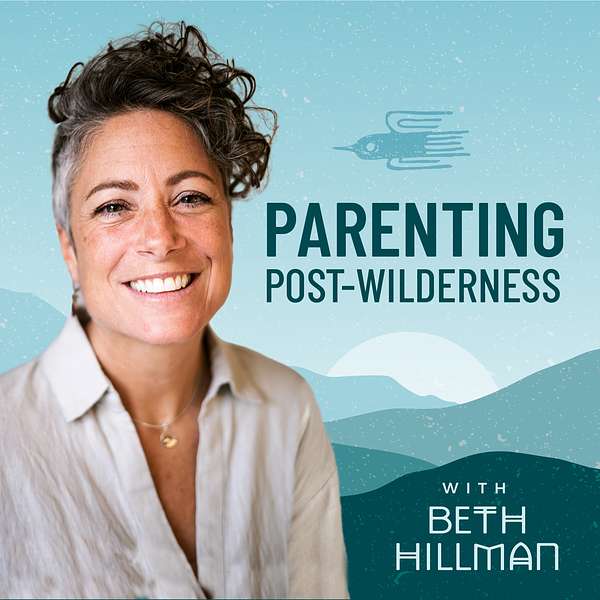
Parenting Post-Wilderness: Parenting a Struggling Teen Before, During and After Treatment
Your guide to parenting a struggling teen or young-adult, whether they’re home, transitioning home, or presently in treatment.
Parents, say goodbye to exhausting confusion, overwhelm, panic and the unhelpful patterns that keep you and your family stuck. Learn how to develop healthy responses and set healthy boundaries with your teen instead of acting out of fear and anxiety.
Experience the relationship-changing power of focusing on your own behavior instead of futile attempts to control your teen.
Your guides to Parenting Post-wilderness are Beth Hillman, a life coach for parents of struggling teens and mom to a post-wilderness teen, and part-time co-host Seth Gottlieb, a wilderness therapy guide turned teen and young-adult recovery coach. Their unique combination of experience and training yields candid conversations chock full of practical, actionable tips and tools to smooth the challenges both parents and teens experience surrounding treatment.
Every week, you can expect conversations around:
- Parenting a struggling teen or young-adult;
- Setting healthy boundaries with your teen;
- Treatment options for your struggling teen or young adult;
- Bringing your kid home from treatment;
- Parenting skills to support your struggling child;
- Teen substance abuse, drug addiction, gaming addiction, suicidal ideation, or other teen mental health concerns;
- How to end power struggles and instead foster healthy communication with your teen or young-adult;
- And much more.
Listen in to discover how parents like you have learned to influence equanimity in the home and rebuild connections with the teens they love.
Connect with Beth on Instagram (@bethhillmancoaching) or find more information about working with Beth at www.bethhillmancoaching.com.
Parenting Post-Wilderness: Parenting a Struggling Teen Before, During and After Treatment
102. Why Your Teen Isn’t Acting Like an Adult
Why doesn’t your teen learn from their mistakes? Or admit when they’re wrong? Why can’t they just act like an adult? If you’ve ever wondered about any of these, you’re not alone. To answer these questions, we’re diving into the world of teenage brain development and what it means for us as parents. Spoiler alert: it’s not as straightforward as you think.
Whenever your teen is acting out, you might think “In what world do you think this is okay?” Here’s our take: In the world where they thought they wouldn’t get caught and in the world where they never experienced this before. This highlights a key issue: teens lack the life experience and brain development necessary to foresee consequences and regulate their emotions consistently.
Here’s the thing: The human brain isn't fully developed until around the age of 25.
This means that emotional regulation is inconsistent, at best. Your teen is in the process of learning but hasn't mastered how to handle intense emotions yet. Reacting impulsively or avoiding situations altogether is a normal part of this learning curve. Growing the brain takes experience. It's through real-world consequences—whether legal, parental, or social—that they start to understand what is acceptable behavior and what isn’t.
One of the biggest challenges we face as parents is letting our kids gain these experiences, especially when they come back from treatment. We see them physically growing up and get smarter, so it’s easy to forget they aren’t adults yet. They might look and sometimes sound like it, but their brains are still catching up.
"If they haven’t had a lived experience in a certain thing, I don’t know how they would actually know"- Beth Hillman
By understanding your teen’s developmental stage, you can better support them become independent adults. Let’s discuss all of this more in today’s episode.
In this episode on why your teen isn’t acting like an adult, we discuss:
- How the human brain isn't fully developed until around the age of 25;
- The only way our teens learn what is acceptable and accepted, and what isn’t, is through real-world life experience;
- The difference between a controlled environment and being controlling;
- The importance of setting boundaries and enforcing consequences to guide behavior.
- How teens' survival brain impacts their decision-making, often leading to impulsive actions;
- Teens are still learning how to manage intense emotions;
- And more!
Need support?
🤍Influence lasting change in yourself and your struggling teen with my private coaching or parent group program specifically created for parents of struggling teens.
🗺️Need help setting healthy boundaries with your teen AND following through? My free guide will help you do so by creating your own Parent Home Plan!
You can support the show by:
Leaving a review
Subscribing to the show
And remember parents, the change begins with us.
✨ 6-week Boundaries Masterclass ✨
Starting January 13th -- Early Bird price until December 31st!
👉🏼 Click here to sign up, or go to bethhillmancoaching.com/boundariesmasterclass
I hope to see you there!
